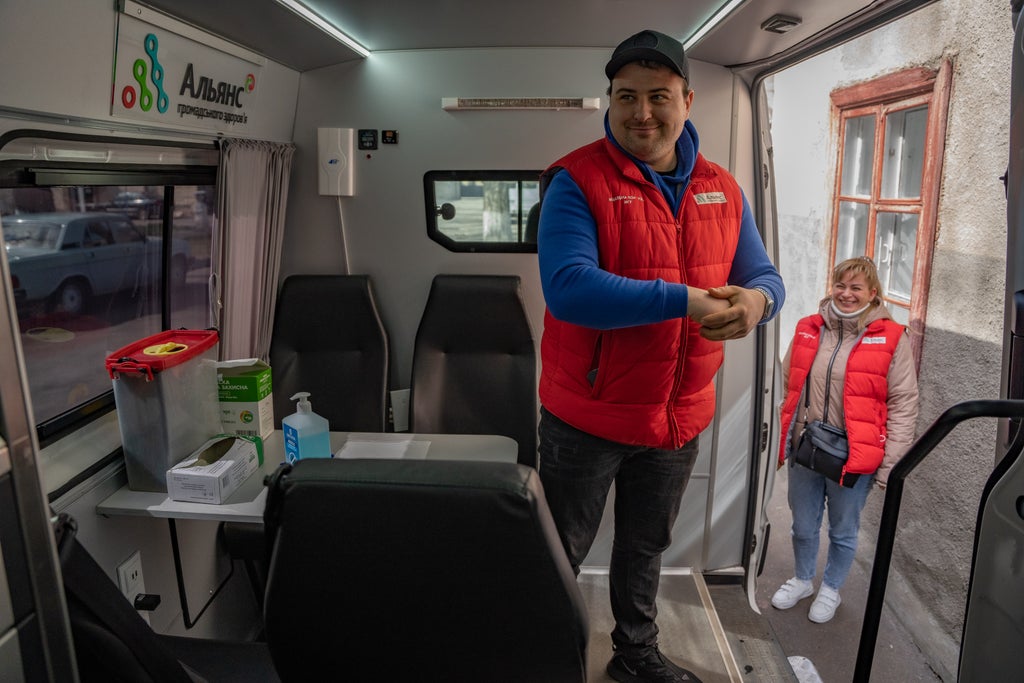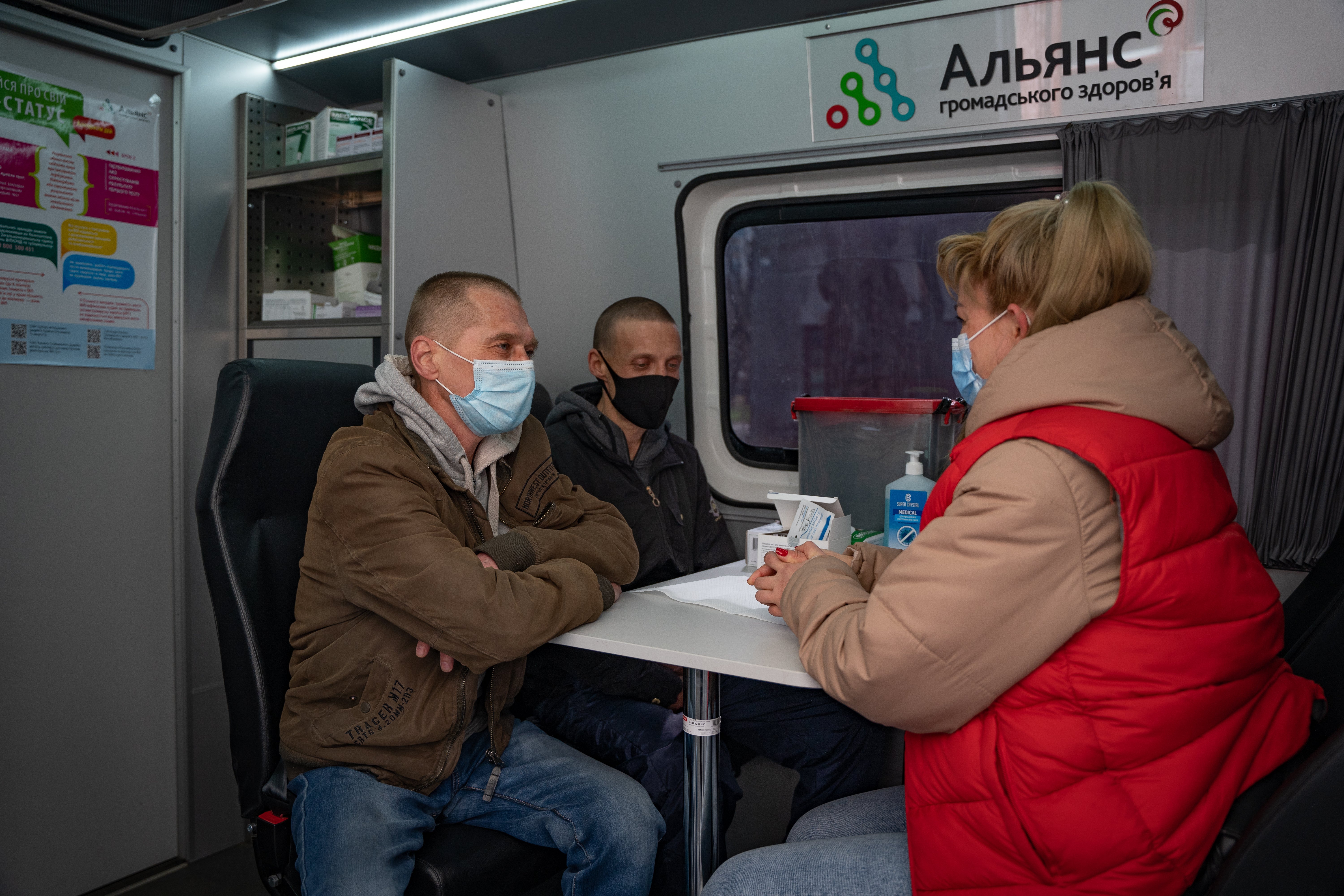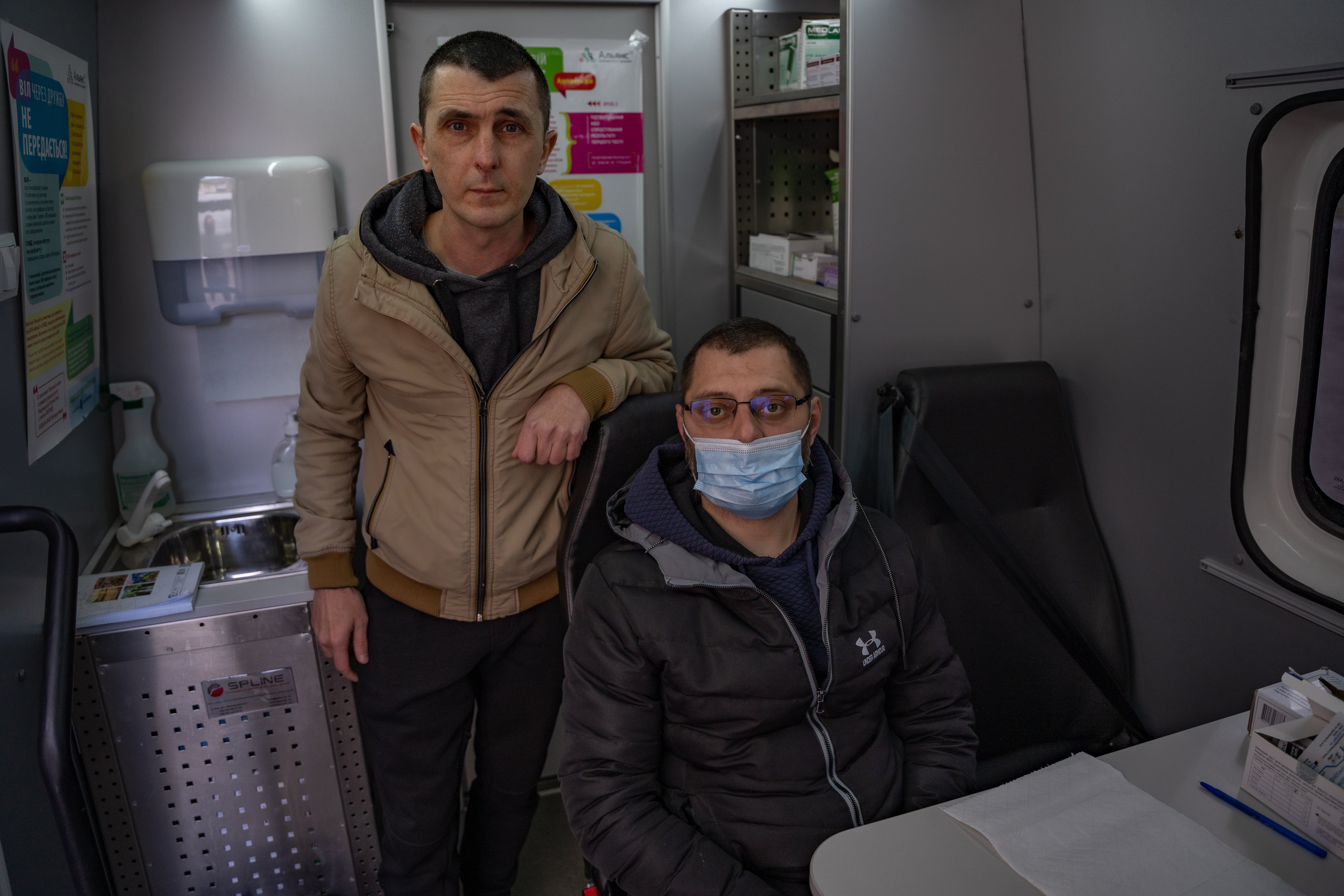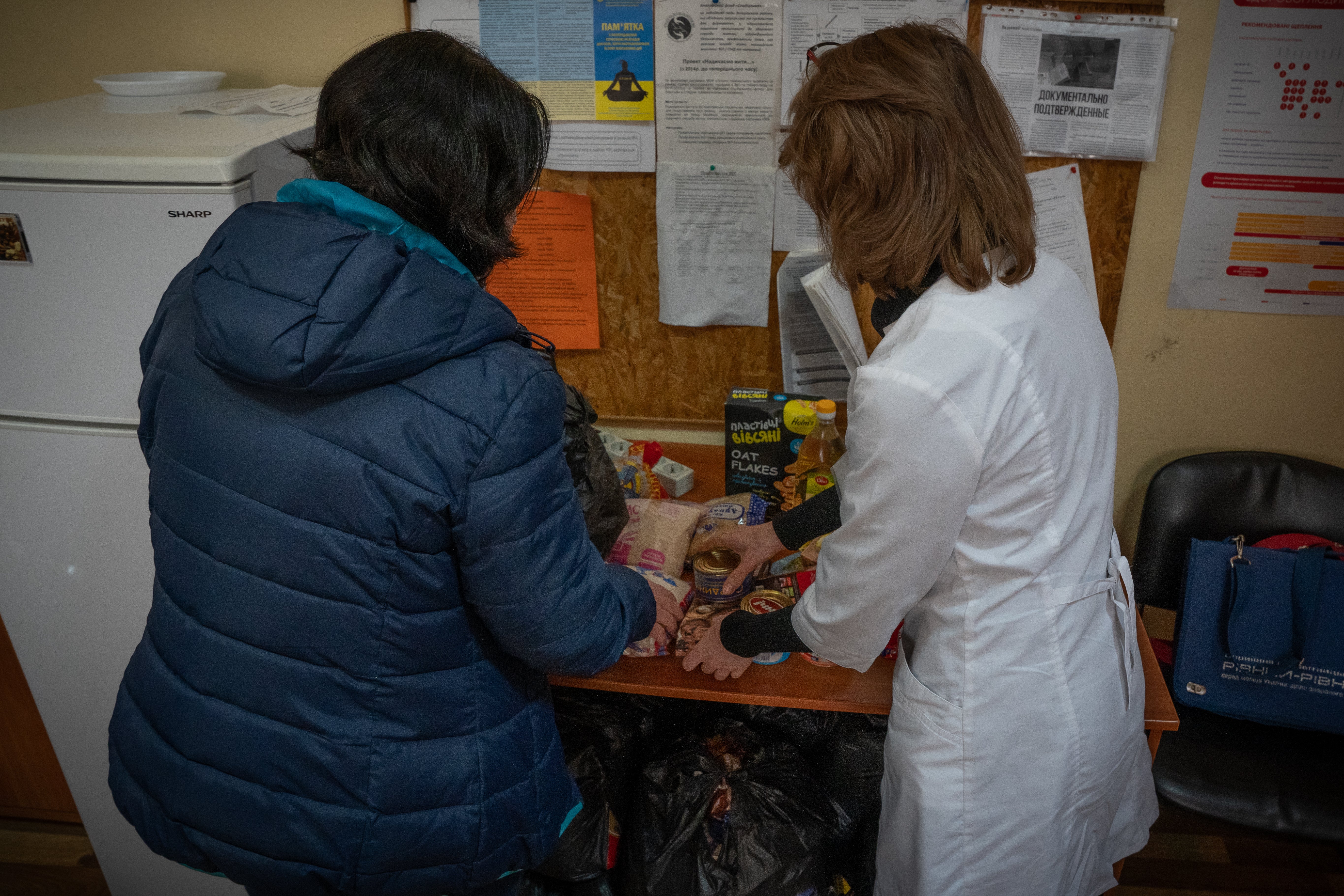
The shelling is so intense that on bad days it turns the sky orange. But despite this, Iryna Bondarenko and her team get in their cars and drive through the explosions to deliver life-saving medicines and services to those living with HIV in Ukraine.
They work with the Alliance for Public Health (APH), Ukraine’s largest health-focused NGO, which since the start of Russia’s invasion has continued to support thousands of people with HIV and Aids across the country.
It is vital work, as Ukraine has one of the highest HIV rates in the world: more than 250,000 of its people are currently living with the virus.
Nearly half of them reside in cities and regions that are currently under heavy bombardment, giving rise to fears that the war will only worsen Ukraine’s epidemic, and that it could even “reverse gains against the virus by 20 years” if treatment and testing is curtailed and medical supplies are strangled.
Reaching the patients – or clients, as they are called by the charity – is the stuff of nightmares, as is getting supplies to areas engulfed by heavy fighting.
In Mykolaiv, where she lives and works, Ms Bondarenko has to navigate a moving frontline, as Ukrainian forces have for weeks repelled Russian attempts to seize the strategic port city.
Kherson, just 40 miles away along the Black Sea coast, is occupied by Russian forces. The team from APH tries to work there around the heavily armed Russian soldiers who patrol the city.
Further down the coast in Mariupol, which has been under siege for more than a month and has endured some of the heaviest bombing, two of Ms Bondarenko’s colleagues are missing.
The phone network was cut off at the start of the fighting. The whereabouts and fate of the two APH staffers are still unknown, while the charity believes its facilities have been bombed.

“We are worried that our teams will be hit by shelling, air strikes, rockets, missiles – everything – but our clients are even more scared. So we have to work, it is essential,” Ms Bondarenko says as she describes explosions near her home.
She says the organisation used to run a well-stocked mobile clinic in Mykolaiv, which would drive around the region providing testing, treatment and social support services for vulnerable communities including drug users and sex workers. But since the war raged through her city, she and her colleagues have resorted to using personal cars or travelling on foot, because the vans housing the clinics “are big, bright, and so could easily become a target for airstrikes”.
“We have to work, we have no choice. It is as important as what the military are doing on the front lines,” she adds.
Ukrainian medical workers fear there will be a surge in infectious diseases, from tuberculosis to Covid, as Russia’s invasion has obliterated swathes of the country’s healthcare system and supply networks.
They are particularly worried about HIV. Before the war, Ukraine was already grappling with the second-largest HIV epidemic in eastern Europe and central Asia, according to Frontline Aids, a global organisation supporting APH that is currently running a major fundraising campaign for the charity.
Eight out of the 10 regions we work in are under bombardment: the areas worst hit by HIV are also the worst hit by war
They say that more than 250,000 people are currently living with the virus in Ukraine, a number that is rising by 15 per cent each year.
Ana Korobchuk, regional coordinator for APH in the coastal city of Odesa, says that most Ukrainians with HIV live in the cities and regions hardest hit by Putin’s invasion. These include some of the coastal cities as well as the areas around Kharkiv and Chernihiv in the east and northeast of Ukraine.
“Eight out of the 10 regions we work in are under bombardment: the areas worst hit by HIV are also the worst hit by war,” she adds.
It has set Ukraine’s fight against HIV and Aids back by 20 years, says Natalia from the charity Spodivannya – a partner of APH that operates in the war-ravaged area around Zaporizhzhia.
“We are extremely worried HIV/Aids will get much worse in war. Right now, the current situation, in terms of lack of syringes, condoms, all the hygienic materials, masks, testing, everything, is as if we have gone back 20 years,” she says. “This is why we are trying to get all the supplies we can to those who need it the most.”
She says she is facing similar problems with her teams in the war-hit areas. Spodivannya has had little to no contact with its team members in the now Russian-controlled city of Berdyansk, which is next to Mariupol on the coast.
“We cannot work in the occupied areas, and worry about our [patients] who are there,” she adds, asking that her surname is not published for fear of retaliation against her staff in those areas now in the hands of the Russian military.

“We have also turned our clinics into humanitarian aid hubs, and are providing drugs, medical supplies and food to the most vulnerable,” she continues.
Meanwhile, both charities say they are worried that the mass movement of people will contribute to Ukraine’s worsening HIV crisis during the conflict.
Vladimir Putin’s invasion of Ukraine has sparked Europe’s worst displacement and refugee crisis since the Second World War. So far more than 4.2 million people have fled Ukraine, and a further 6.5 million people have been uprooted internally.
Korobchuk fears that this will see Ukraine’s HIV epidemic spread more widely. “We are currently getting up facilities in the western city of Lviv, to manage this,” she says.
The main concern, however, is for the clients themselves, many of whom are from vulnerable, impoverished and marginalised communities.
Most do not have the documents that would allow them to leave the country should medicines run out, and are struggling with addiction while illicit drugs, along with the medicines to help them deal with their dependency, are increasingly scarce.
Anatoly, who is 39 and frail, receives treatment for HIV from APH. He does not want to leave Ukraine, but fears he will have to if the medicines run out.
However, as a man of fighting age, he is not permitted to leave via any of Ukraine’s borders following a general mobilisation issued by the Ukrainian president. Having become addicted to heroin aged 15, he is now six years clean, but still grapples with the social stigma of being a former addict.

“I am really worried about those who are stuck in places like Mykolaiv,” he tells The Independent while sitting with his social worker Liudmyla.
“When I first met my social worker, I couldn’t stand, I was so sick. The treatment has saved my life. I worry what will happen to supplies if this continues.”
His fears are shared by Oleg, 43, who also became an addict as a teenager and found out he had contracted HIV in his thirties.
“In the end it will be the Russians who will halt our treatment, which would be a disaster,” he says.
The medics and social workers, meanwhile, are working hard to ensure their services are not stopped. For Iryna, that means finding creative ways to get the supplies to those most in need, despite the shelling.
“For many of us, we don’t know if we will wake up tomorrow, if the next afternoon will come,” she says, as she prepares for another day working in a war zone. “But today we work, because we have to.”
The Independent has a proud history of campaigning for the rights of the most vulnerable, and we first ran our Refugees Welcome campaign during the war in Syria in 2015. Now, as we renew our campaign and launch this petition in the wake of the unfolding Ukrainian crisis, we are calling on the government to go further and faster to ensure help is delivered. To find out more about our Refugees Welcome campaign, click here. To sign the petition click here. If you would like to donate then please click here for our GoFundMe page.







